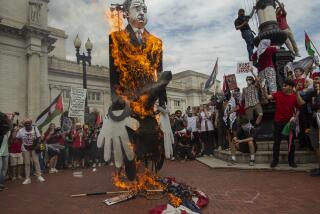Soviet Parties Unite Against Communists
- Share via
MOSCOW — Democrats from 10 of the Soviet Union’s fledgling parties and two dozen other political organizations formed a united front Sunday against the shaken but not yet beaten Communist Party.
Democratic Russia, which claims support from 30% of the Parliament of the Russian Federation and 60% of both the Moscow and Leningrad city councils, hopes to achieve a step-by-step takeover of power from the Communist Party, which has governed the Soviet Union for more than 73 years.
To end this long monopoly on power, the new democratic movement, in a series of resolutions adopted at a weekend congress in Moscow, called for creating a multi-party democracy with a market economy based on private ownership of property.
“The Communist Party bosses think they will be able to keep their monopoly intact because their democratic opponents are fragmented,” said Vladimir S. Vedenkov, a delegate from Krasnoyarsk in Siberia. “This movement will help the opposition organize against the Communist Party.”
Although the Communist Party gave up its constitutional monopoly on power early this year, no strong party has surfaced as an alternative in Russia, the largest of the Soviet Union’s 15 constituent republics.
“This is the first step toward the unification of democratic forces,” said Yuri N. Afanasyev, a founder of Democratic Russia and a member of the Congress of People’s Deputies, the national Parliament. “It won’t be a party. It will be a coalition of sovereign, independent movements and parties.”
Democratic Russia brings together most of the newly formed and still-small parties in Russia: the Christian Democrats, the Democrats, the Democratic Union, the Peasant Party, the Party of Free Labor, the Party of Russia, the Social Democrats, the Constitutional Democrats and others.
With more than 1,200 delegates from across Russia, the founding congress adopted more than a dozen resolutions, ranging from demands for the resignations of Prime Minister Nikolai I. Ryzhkov and his government to calls for the independence of Russia from the Soviet Union.
“It was very surprising to me that it went so smoothly,” said Arkady N. Murashev, a leader of the Democratic movement in the Congress of People’s Deputies. “I expected if not a split, then many deserters.” Murashev, 33, a physicist, remarked that compromises struck during the congress were not easy “considering the tense crisis” in the country.
In both the resolutions and the speeches, Democratic Russia clearly supported Russian Federation President Boris N. Yeltsin and a radical path toward a market-based economy. But Yeltsin and other high-profile democrats were conspicuously absent from the congress. Yeltsin, who is still recovering from injuries suffered in an auto accident about a month ago, sent a message of support but no one to speak on his behalf.
Although the congress was intended to pull together the diverse parties and establish a strong leadership with a clear strategy, Democratic Russia remained amorphous, without concrete plans, as the delegates decided to await further developments before moving ahead.
Democratic Russia has existed informally since the local and regional elections last spring. Its leaders wanted to create a tighter organization because no one party had emerged as the leading opposition to the Communist Party despite its accelerating decline. They called for early elections in Russia in the hope that it would help galvanize their fragmented ranks.
In a mark of the weakness of the new parties, the country’s most prominent democrats, including Yeltsin, Moscow Mayor Gavriil Popov and Leningrad Mayor Anatoly A. Sobchak, have not joined any of them after quitting the Communist Party.
“There are so many parties arising in rapid succession--a new one arises almost every day, and each is ‘better and more democratic’ than the others,” said Oleg I. Orlov, a leader of Democratic Russia and a member of the Moscow City Council.
“But if those parties took part in an election, they would not be supported by a big percentage of the population. The majority of the people are, without a doubt, in favor of democratic changes, but they still have not determined their party affiliation.”
The democrats say it is especially critical for them to combine their efforts now so that they can wield influence as plans for the country’s economic make-over are being completed.
Soviet President Mikhail S. Gorbachev won legislative support Friday for an economic plan to lead the country toward a market-based system. But the approved pace is much slower than that desired by Yeltsin and other radicals. Yeltsin has said Russia will proceed with the bolder “500-Day Plan,” which envisions a more rapid transition.
Democratic Russia hopes to use the power it gathered at the congress to back Yeltsin.
“We want the government to see that the people are not just sitting by passively,” said Baata Makhatadze, 23, a delegate from Krasnodar in southern Russia, “but have united together against the Communist Party, against Gorbachev and behind Yeltsin.”
More to Read
Sign up for Essential California
The most important California stories and recommendations in your inbox every morning.
You may occasionally receive promotional content from the Los Angeles Times.










